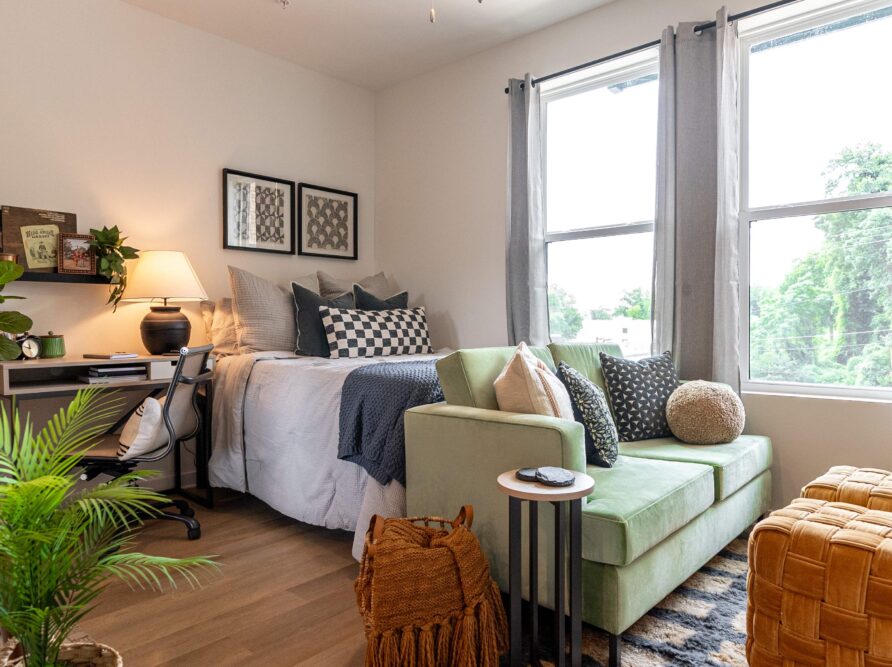Living off-campus in Athens can be very appealing to UGA students. You can have your own bathroom, cook for yourself, enjoy more flexibility, and sometimes even save money. However, it can be easy to get excited about the base rate that you see online and forget to account for all of the additional costs you need to consider when renting an apartment.
Read Next: How Much Does it Cost to Live Near the University of Georgia?
At Rambler, our leasing team has helped hundreds of students find housing, and we understand that additional costs can come as a surprise.
@ramblerathens Here are some additional costs to consider when looking for an apartment!!🌾 #uga #godawgs #uga25 #uga26 ♬ original sound – Rambler
To help you plan your student housing budget, we have compiled a list of ten additional costs to consider when living near the University of Georgia.
Read Next: Ultimate Guide to Living Off-Campus for UGA Students
9 Costs to Consider on Top of Base Rent in Athens, GA

1. Application Fee
Most properties require prospective tenants to pay an application fee, which typically ranges from $50 to $150. This fee covers the cost of your background check as well as the administrative cost of processing your application.
Make sure to budget for this fee when calculating your housing expenses. Some apartments offer waived or discounted application fees as an incentive to sign a lease, so be on the lookout for these types of promotions.
2. Admin Fee
Admin fees tend to range between $50 to $300. They are used to cover the price of administration, billing, bill auditing, overhead, and similar expenses.
Some apartments require this fee at the time of application, while others require it on move-in day. Admin fees are typically non-refundable, so make sure to confirm with your apartment if you’ll be reimbursed if you decide not to sign a lease.
3. Parking
Finding parking in Athens, especially parking near campus, can be a challenge. Most student housing apartments near UGA offer long-term parking contracts for the period of your lease. Contract parking options vary in price from around $75 to over $250 per month, depending on the location, demand, and type of parking garage.
Read Next: Ultimate Guide to Parking near The University of Georgia
4. Security Deposit
A security deposit is a refundable fee held for the duration of your lease term. Security deposits usually range from around $100 to the equivalent of one month’s rent.
Security deposits are typically due at the time of move-in and refundable at the end of your lease term, as long as there are no damages to the apartment beyond typical wear.
After moving out, your landlord will take into account any damages and evaluate the cost. Your landlord has the right to deduct the amount needed for repairs before returning your security deposit back to you. However, as long as you keep your apartment in good condition, you should have this fee returned to you within 45 days of moving out.
5. Utilities
Utilities are one of the biggest costs of renting a student apartment. Utilities include electric, gas, trash, water, cable/TV, internet and washer/dryer. The cost varies by month, depending on your usage. Some leases include certain utilities in monthly rent, but this varies at every apartment complex.
Since average utility prices vary greatly, ask your landlord what standard utility rates are each month before signing your lease.
Many utility companies charge a fee to cover the costs of utility setup. This fee is a one-time charge and generally ranges from $25 to $100.
Many student housing apartments include Wi-Fi, cable TV and washer/dryers in your monthly installment. Others do not, so it’s important to ask before you sign a lease.
Read Next: 15 Questions to Ask While Touring a Student Property in Athens
6. Rental Insurance

Most apartments require tenants to get renter’s insurance during the term of their lease. However, even if not required, rental insurance is highly recommended. Renter’s insurance is usually affordable, ranging from around $10 to $35 per month depending on coverage.
If you would like more information on renter’s insurance at Rambler Athens, please contact our leasing office.
Read Next: A UGA Student’s Guide to Renter’s Insurance
7. Trash
In order to maintain a clean property, most student apartments require residents to pay a monthly fee for trash removal. The cost typically falls within the range of $5 to $30, though some apartments may not charge extra for this service.
8. Moving Costs
When moving in or out of an apartment, there are often unexpected fees to consider. These may include costs for storage space, cleaning services, and moving services. Depending on your needs, these expenses can range from less than $50 to over $500.
Storage Space
If you have a gap between leases, you might need a storage unit near UGA to hold your belongings. Off-site self-storage options like CubeSmart or Chase Street Self Storage typically range from $40 to $500 per month based on unit size.
To help you out, we’ve put together this list of self storage options near UGA.
Cleaning Services
When moving out of a student apartment, it’s important to leave the space clean to avoid additional charges. Hiring a cleaning service can cost around $100 to over $400, depending on the extent of the cleaning needed. Some residents also opt to hire a cleaning service when moving in, particularly at older properties. Generally, student apartment cleaning services fall on the lower end of this cost range.
Moving Services
Hiring movers can also add to your moving costs, with fees typically ranging from $25 to $50 per hour for each professional and an additional $20 to $50 per hour for the moving vehicle. Some apartment complexes provide movers to assist new residents on move-in day, but you should consider these costs when creating your housing budget.
9. Pet Fees and Rent

If you’re planning to bring your pup along with you, be prepared to pay extra fees. Most student housing apartments require a pet deposit, which ranges from around $100 to $350 and is generally refundable. This deposit is due at the beginning of your rental term and is intended to cover any damages your pet may cause beyond normal wear.
In addition to the pet deposit, many apartments charge one-time, non-refundable pet fees, which are also typically between $100 and $350.
Monthly pet rent is another fee you’ll need to factor in, which can range from around $10 to $35 per month per pet. Keep in mind that some apartments may charge varying rates depending on your pet’s size, while others charge a flat fee for all pets.
It’s important to consider all of these fees when creating your monthly budget, as they can add up quickly. Be sure to ask your landlord or apartment complex about their specific pet policies and fees.
Read Next: What Fees Should I Expect to Pay When I Sign a Lease at Rambler?
We hope this article has helped shed some light on additional costs to consider when renting a student apartment in Athens. If you have any questions, contact Rambler’s leasing staff, who are more than happy to answer any questions you may have during your housing search!




